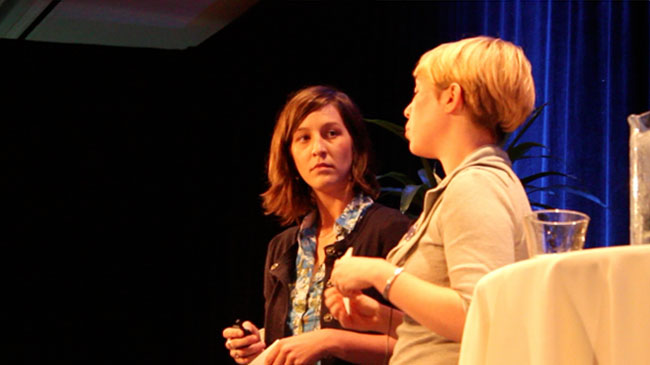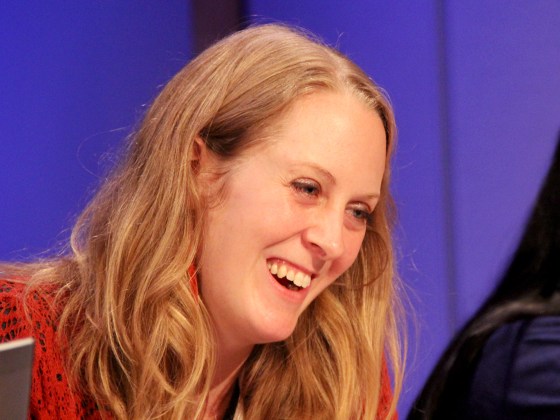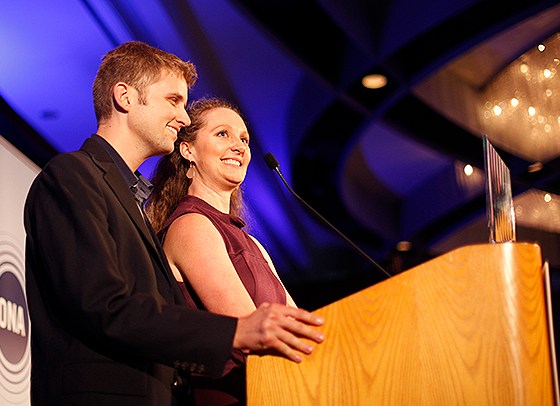
Watch live streaming video from ona09frontendsessionsat livestream.com
Collecting and displaying data about air quality, sound recordings and elections are just some of the focuses of this year’s winning Knight News Challenge projects.
The six winners, who were announced on Thursday, Sept. 20, presented PowerPoint presentations explaining their projects and goals to fellow journalists during the Online News Association conference’s Lightning Round.
The winners showed the audience their projects’ potential as new, innovative tools for journalists, and described the idea and motivations behind their projects.
The six winning projects are: Local Data, $300,000; Pop Up Archive, $300,000; Census.IRE.org, $450,000; Safecast Radiation & Air Quality, $400,000; Open Elections, $200,000; OpenStreetMap, $575,000.
Q and A with the winners:
Alicia Rouault, Local Data
ONA: What is Local Data?
Rouault: Local Data is a new digital toolkit that allows community groups of all capacities to collect and manage place-based data online.
ONA: Why do you think data journalism is important?
Rouault: Data is important to journalism, especially from the Local Data perspective, because it allows communities to have a voice in the data they are collecting to then be presented in a much more consumable way.
Levi Simons, Safecast Radiation & Air Quality
ONA: What is Safecast Air?
Simons: Our goal is to make an open air-quality monitoring network so that people can record on a real-time basis what is in the atmosphere, and upload that into a public database.
ONA: Why do you think data journalism is important?
Simons: Journalism, just like science, if you don’t have quantitative data, you are arguing over nothing.
ONA: Do you have one piece of advice for journalists who want to incorporate data into what they do?
Simons: Data, like human beings, are all sources. If you don’t cite where it came from, you don’t know where the errors are.
Bailey Smith, Pop Up Archive
ONA: What is one thing about data that is important to journalism?
Smith: You have all these great stories, great sounds, but only a fraction of what’s recorded makes it onto the air. The rest of the audio lives in a file somewhere, lots of times just on someone’s personal computer. So there are all these files, some of them living at NPR and say some with The Kitchen Sisters, and if their being described and stored at all, their being described in a different ways. In order to make that material shareable, so that producers can remix and reuse content, we need to start saving and describing that material systematically.
ONA: What is Pop Up Archive?
Smith:Pop Up Archive makes media searchable, reusable and shareable, without requiring a programmer of an archivist. We use standardized metadata, so that in the future producers and organizations will be able to easily share files online and so that programmers will be able to create applications that use these files. We’re also planning for preservation and distribution. Currently we use the Internet Archive to back up audio and SoundCloud for distribution but in the coming months we’re planning to incorporate other audio sharing services. We’re trying to make this process work with existing workflows, so that producers can integrate archiving seamlessly and so that moving forward we aren’t in a position where these great resources are being underutilized or even getting lost.
Joe Germuska, Census.IRE.org
ONA: What is Census.IRE.org?
Germuska: Census.IRE.org aims to make it dead simple for journalists to use census data.
ONA: Why do you think data journalism is important?
Germuska: I think journalism is best when it’s grounded in facts. Stories bring it to life, but facts make sure there is no leaping to conclusions, and data is a great way to make sure your story is well grounded.
ONA: Do you have one piece of advice for journalists who want to incorporate data into what they do?
Germuska: Don’t be afraid of data. Check it out. There are a lot of things making it easier to use all the time. Give it a shot.
Editor’s note: ONA was unable to interview Derek Willis and Serdar Tumgoren of Open Elections and Eric Gundersen of OpenStreetMap for the Q and A. See the live stream video above for information on their projects.
Below is a sampling of the social conversation around the presentation:
The six winners of the Knight News Challenge: Data grant presented their project plans and goals at the 2012 Online News Association conference in San Francisco.
View the story “ONA12: Knight News Challenge: Data Lightning Round” on Storify
ONA12: Knight News Challenge: Data Lightning Round
The six winners of the Knight News Challenge: Data grant presented their project plans and goals at the 2012 Online News Association conference in San Francisco.
Storified by Katherine Borgerding · Sat, Sep 22 2012 17:03:41







You must be logged in to post a comment.